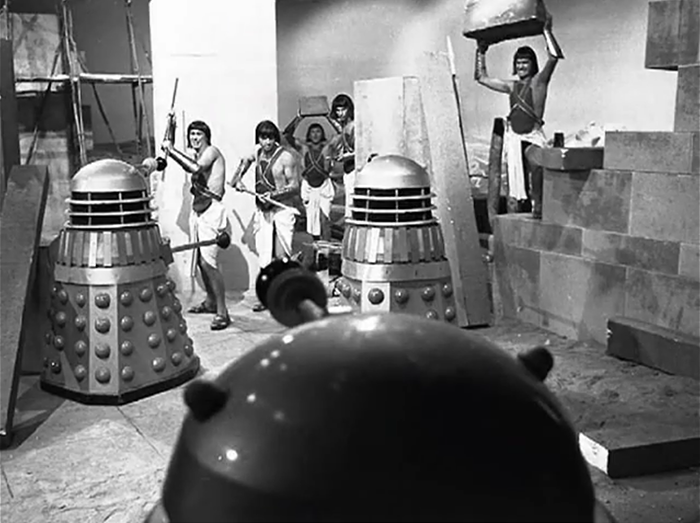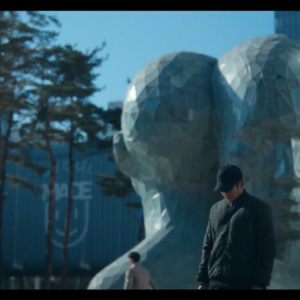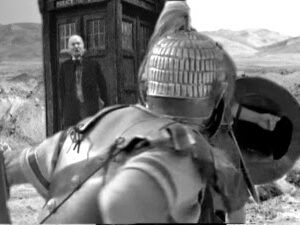
The greatest disappointments come from the greatest expectations.
I admit I went into Star Trek‘s latest televisual offering with great expectations, even though I should have learned better by now. Patrick Stewart’s Picard is my favourite Captain and his Next Generation was one of the most progressive vehicles the franchise ever produced.
Star Trek: The Original Series (Star Trek: TOS) was a Space Western with pretensions to great science fiction (although in terms of story itself those pretensions were not unwarranted). Despite being forced into a narrative vehicle that would appeal to an American public barely out of the 1950s and wanting fantasies about a rugged individualistic male conquering the wilderness, Star Trek: TOS had some truly brilliant science fiction stories. And whether you feel these were ruined by Kirk’s frontiersmen machismo or not depends entirely on you.
Still, Jean Luc Picard was not a man of the 1960s; he was a man of the early 1990s. He was an intellectual, a diplomat, a peacemaker. Picard came onto the scene in a time when America and the world were celebrating brains over brawn and the victory of cooperation over conflict. A time after the Berlin Wall fell but before the Iraq War and the misnamed War on Terror led to the ascension of the not-at-all misnamed Toxic Masculinity.
The success of Star Trek: The Next Generation led to other, similar vehicles. Star Trek: Voyager and Star Trek: Deep Space Nine. But slowly Star Trek was succumbing to the social changes happening in the US around and post the fall of the Twin Towers: more religion, more capitalism, more terrorism and… somewhat inevitably… a lurch back to nostalgia. More masculinity. More frontiers.
Post-911, suddenly Kirk was back in style.
But not just Kirk; a Star Trek that emphasised its space Western roots. A masculinity of rugged individualism and cultural exceptionalism. The Federation bringing civilisation to the Universe in an ongoing class of cultures. Small stories. Big explosions. The male lead as the Great White Saviour. Everything old was new again and not necessarily in a good way.
I have no idea whether the recent Star Trek: Discovery was a response to this or not. Clearly influenced by the modern preference for fantasy over science fiction, Discovery was nonetheless progressive in a way that the original Star Trek series were trying to be progressive. Its story wasn’t particularly good – being too heavily influenced by modern Tolkienesque tropes and willing to sacrifice characterisation and canon for plot – but its intentions were.
Star Trek: Discovery seemed to signal a desire for the franchise to go back to the spirit rather than the letter of its nostalgia – progressivism. Not the show that put a gun-ho white man into bed with as many female aliens as possible while fighting off the Klingons. But the show that put an Asian man and a woman of colour on the bridge.
In this context, a desire for everyone to dust off a Captain like Picard seemed like a good sign. As a pushback against a culture of anti-intellectualism, toxic masculinity, overt religiosity, and disturbing nationalism, Jean-Luc Picard was an obvious choice. Assuming that’s what the franchise was trying to do. But certainly Discovery’s choice of characters and narrative decisions suggested it was.
And thus we get back to the point of my introductory paragraph. I came – possibly unfairly – into Picard with great expectations and was thus quite badly disappointed.
As it turns out, having a privileged old white guy come out of retirement to save the Universe by telling it what to do? Not the best look right now.
Picard is a story about one of the elite struggling with who they are now that nobody listens to them anymore. It’s an inauspicious thematic underpinning to a show that regularly resorts to the Great White Saviour trope over and over again without seemingly even realising its doing it.
The Plot
Set 20 years after the film Star Trek: Nemesis, Jean-Luc Picard has retired to his French vineyard and is deeply affected still by the destruction of Romulus and the death of the android, Data (Star Trek: Nemesis, 2002).

In fact, the poignant memory of Brent Spiner’s Data infuses every part of the first episode; one that has a powerful underlying theme. An artificial lifeform spent his life and death aspiring to be the best of humanity while humanity itself failed to live up to that aspiration. It’s the first and almost last time the show is both profound and poignant and, unfortunately, merely set me up for more disappointment.
When Picard is approached by a young woman named Dahj who claims people are out to kill her, he gets drawn into a complex conspiracy spanning centuries, the Romulan’s really truly secret police, a dead Borg cube, and Data-like androids, now referred to as ‘synthetics’.

After the Federation refuses to back a mission to find and possibly rescue Dahj’s sister, Soji, Picard pulls together his own ragtag band of misfits and heads into space to do the mission anyway.
What follows is a series of poorly-executed half-thoughts, characters who are mere chalk outlines, a nostalgia tour, and a narrative that is thematically confused.
From the second that the show fridged Dahj – a young female android – to propel Picard’s arc, I should have realised that the writers just hadn’t thought this one through. For a Star Trek franchise to fridge a female character so its old white male lead can begin his new hero’s journey was almost unfathomable to me. But it happened and it happened halfway through episode 1.
Fantasy, vanity and nostalgia
It was the brilliant Mallory Ortberg who said in their Discovery recaps on the Vulture (read them, everything Mallory writes about Discovery is an art form that transcends the episodes themselves) that Star Trek has essentially become fantasy.
We have to go to Pandora Pahvo because only their magic crystal tower can penetrate our enemies’ Invisibility Cloaks, but we’re holding tricorders, so it’s science.
Star Trek: Picard is not only not an exception but it is so clearly a Tolkienesque fantasy that it’s hard to take it seriously. Our hero in exile experiences a tragic death that leads him on a quest to defeat a brewing evil. On the way he meets up with a number of old friends and learns something about himself while he saves the universe.
I’d come up with a suitable analogy for who Jean-Luc Picard is in this particular narrative but I have too many choices. Think Luke Skywalker meets Gandalf and you’ll come close.
Picard gets assistance initially from two Good Elves – sorry, Romulans – who he took in after the destruction of Romulus 20 years previously. They use their magic – sorry, their technology – to overcome the dark magic of the Bad Elves: a secret secret Romulan secret police that’s secret even to the real secret police.
That’s the sole purpose of the Zhat Vash. To keep a secret so profound and terrible that just learning it can break a person’s mind.
Armed with knowledge of the Dark Elves’ nefarious doings that involve their deep antipathy towards synths for reasons that are very very secret, the very much-retired Admiral Picard marches into Starfleet and demands a ship for his mission. At this point he’s told to get over himself and frankly I don’t blame them. It’s an inauspicious note for us to leave the second episode of this show. Picard comes across as arrogant, entitled, almost obnoxious in his hubris.
Who is this person who used to combine soaring intellect with humility and compassion? Where did he go? And who has been left in his place?
It says something that the show’s best moments come from characters slapping this new insufferable Picard down. At one point he and Soji take refuge on a planet where Troi and Riker have made their home. This sunlight-dappled detour into nostalgia is the season’s strongest episode by far, culminating in Troi reading Picard the riot act for his behaviour.
Unfortunately this detour simply serves as a reminder of how well-characterised previous iterations of the show were in comparison to this particular vehicle. Characters from previous Star Trek shows shine in their complexity; not just Troi and Riker but the Data we see in flashbacks and a luminous Seven of Nine – even if the latter is treated as a walking deus ex machina and thrown randomly into a lesbian plotline with a character she has barely spoken to.

The characters created for Picard are flat and one-dimensional in comparison, grist for the narrative mill of Picard’s arc in the same way as Dahj was.
This is Picard’s World. Other characters are merely allowed to visit.
Dr Livingstone, I Presume

Regardless of the show’s other problems, it’s Picard as Great White Saviour that is ultimately the most problematic. Picard‘s biggest problem in the end is that it is a story about a privileged old white guy asserting himself on the Universe in the belief he knows better than everyone else.
The coding in the scene above is just one example of many littered throughout this season. A genteel elderly moneyed white man in a linen suit meeting with the grateful natives he’s saved.
The underling theme that the universe would be better if we all just listened to Picard may have worked even 20 years ago. But those days are past.
The Ending
After 8 episodes of Picard lecturing us and Starfleet about the need to treat synths like Soji as sentient beings while trying to stop the increasingly-ridiculous Zhat Vash from murdering them all, we discover the synths actually were the threat the Romulans were warning us about all along.
It’s a bewildering twist. Now instead of saving the synths from the Romulans, Picard has to save the universe from the synths: something that would not have been necessary if Picard had just stayed at home and tended his pinot.
Picard and his obligatory crew of misfits then have to hold off the Romulans with what is essentially magic while they try to stop the synths from completing the Great Magic Tower to summon a demon that will destroy humanity.
I wish I was exaggerating about either of these things.
Instead of blaming Picard for nearly unwittingly causing the destruction of all organic life, he is nonetheless feted as a hero. He then dies, converses with the remnants of Data’s consciousness in some kind of virtual purgatory, and, in a rather astonishingly tone deaf saviour narrative, is reborn with a new synth body.
I suppose I should just be grateful he didn’t have to do 40 days and nights in the desert before Dumbledore sent him back to the world of the living.
Picard lives to lecture the universe for another day.
Happy ending.
Can’t wait for season 2.





Lee – so thought provoking on so many levels. Marvellously, so. I enjoyed Picard for the most part. It did go off for me in the second half, then bounced back.
Personally, I thought they did well the whole “my life as the privileged last great white hope that nobody longer cared about.” It resonated quite strongly with me. I have been there, where one’s legacy is ingloriously pulled down. So, at some point, down the track, you go back out there and do what you can do, a shadow of who you once were. The first time I was appointed as a CEO (a long time ago, in what seems like an alternative universe), staff asked me what tea I would like. I responded: Earl Grey. The smile I got back was one of excitement: “Jean Luc Picard,” they said. My reply “if only😊” I never thought of myself as privileged, but I have had the good fight with those who have tried to unceremoniously oppress others.
With Picard itself, there are two very strong messages for the fandom. The first is, Patrick Stewart has forgiven Star Trek re Nemesis. The second is Brent Spiner has made peace with Star Trek (he had washed his hands of it).
With Discovery, I thought it was boldly going where it needed to go. Many fans haven’t liked it though. Now we have Pike as a series on the horizon. And yes, I’m excited because there is going to be more space opera in the offing.
DS9 is my favourite Trek. I still have a copy of Omni Magazine that wrote about DS9 before it’s initial release and what it meant for the future and the importance of space exploration/colonisation/habitation – imagine that – here we are all these years later it is finally starting to happen. Anyway, we are rewatching the original series once more. As William Shatner said the other day, he is waiting to see when the cancel culture catches up with him re his outing as Kirk.
In the second season of Picard, Guinan will be back. She is what would be called “a conscience interplanetary.” This in itself, is a powerful statement. Whoopi Goldberg as we know takes no prisoners when it comes to her view on the world.
We know Patrick Stewart is very taken with Moby Dick. Perhaps, this is Picard’s real purpose. However, Gandalf is apt:
“You cannot pass,” he said. The orcs stood still, and a dead silence fell. “I am a servant of the Secret Fire, wielder of the flame of Anor. You cannot pass. The dark fire will not avail you, flame of Udûn. Go back to the Shadow! You cannot pass.”
If only…
I was personally thrilled that Brent Spiner came back to Star Trek, even if it was just for a few episodes. I think his Data is wonderful. Also… super super sexy if I do say so myself. To this day, I have the hots for Data. I don’t mind saying it. And I am not alone either. I know many women who feel the same way and Brent Spiner has said that Data got quite a few love letters back in the day.
Despite how disappointed I was in this season I will be back for the next one. Hopefully they’ll do some better work around the plotting and characterisation.
Thanks for commenting as usual!